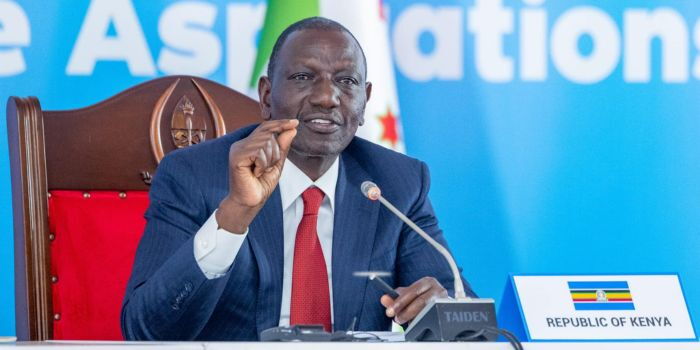President William Ruto has arguably faced one of the toughest years of his tenure in 2024, and for good reason.
Two years into his presidency, Ruto has learnt the hard way that it is exceedingly difficult to win over a new generation of Kenyans, who are known for openly voicing their grievances on social media.
In an era dominated by social media and widespread online outrage, the President has been compelled to maintain as much transparency as possible regarding the activities of the Kenya Kwanza government.
As a result, the government has made some landmark decisions, many of which have been driven by pressure from Kenyans effectively forcing the President’s hand.
President William Ruto addressing Kenyans during the 2024 Jamhuri Day celebrations. PHOTO/ William Ruto
Tossing out the Finance bill
On Thursday, 9 May 2024, a controversial Finance Bill was introduced, marking the beginning of an unfortunate chain of events.
Perhaps unbeknown to the government, Kenyans were fully aware of the specifics of the bill and, for the most part, were dissatisfied with the proposed taxes, which they argued were excessively burdensome.
To make their grievances known, Kenyans, particularly the younger generation, took to the streets, urging President Ruto to scrap the contentious bill, which included new levies on various basic commodities.
On 25 June, Ruto succumbed to public pressure and declined to sign the bill—a decision that proved pivotal in the country’s history.
Cabinet Shakeup
In the aftermath of the anti-Finance Bill protests, President William Ruto made arguably the most significant shake-up of the year in June 2024 by deciding to dismiss his entire Cabinet.
The move was largely welcomed by Kenyans, who felt it was high time the President established a more effective Cabinet.
A few days later, Ruto appointed new Cabinet Secretaries, who were sworn in as part of the President’s “broad-based government.”
According to Ruto, the newly constituted broad-based administration was designed to unlock the country’s full potential.
Move from NHIF To SHIF
The government, through the Ministry of Health, rolled out the Social Health Authority (SHA), which took over from the National Hospital Insurance Fund (NHIF), on Tuesday, October 1.
President Ruto was keen on living up to Kenya Kwanza’s manifesto, which had promised improved and accessible healthcare as part of his key agendas.
The new system, however, has proven to be difficult to implement as Kenyans are still apprehensive, with the government admitting the system was not flawless.
Cancellation of KETRACO deal
Another landmark decision by President Ruto was the cutting of ties with Indian conglomerate Adani after mass opposition from the public.
Ruto’s decision was accelerated after Gautam Adani was embroiled in a sensational $265m bribery claim.
Adani stood accused of orchestrating a Ksh 32.3 billion ($250m USD) bribery scheme and concealing it to raise money in the US.
Ban on public contributions
While President Ruto’s Harambee ban was not directly prompted by public outcry, it was a long time coming as Kenyans have been consistently on the government’s neck on the tedious question of accountability.
In July 2024, the President boldly declared no state officer would be allowed to donate to churches and other institutions, saying, “No state officer or public servant shall participate in public contributions henceforth. The attorney general is hereby directed to prepare and submit legislation to this effect and develop mechanisms for structured and transparent contributions for public, charitable and philanthropic purposes.”
President William Ruto engages with Cabinet Secretaries at State House Nairobi on Tuesday, December 17, 2024.
PCS


